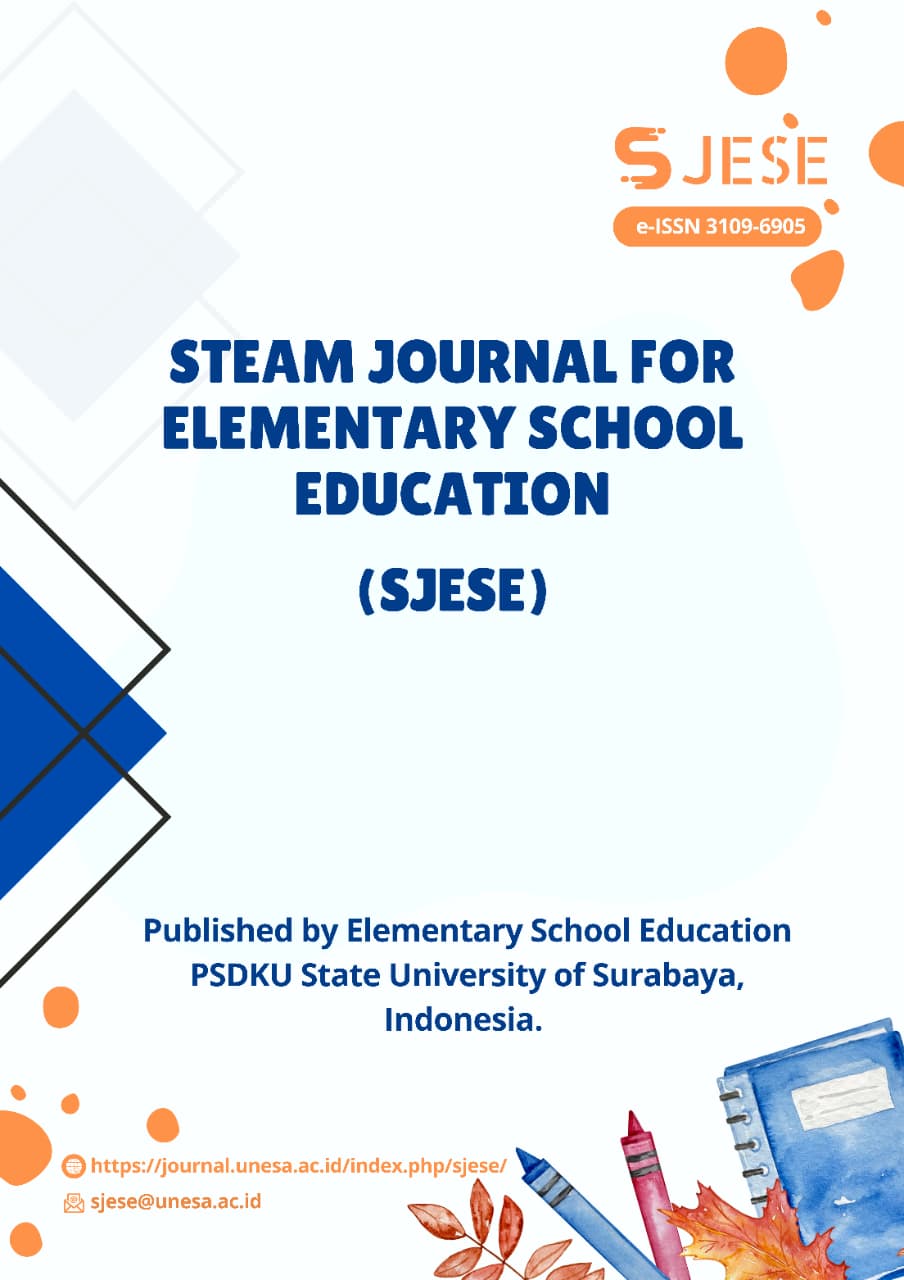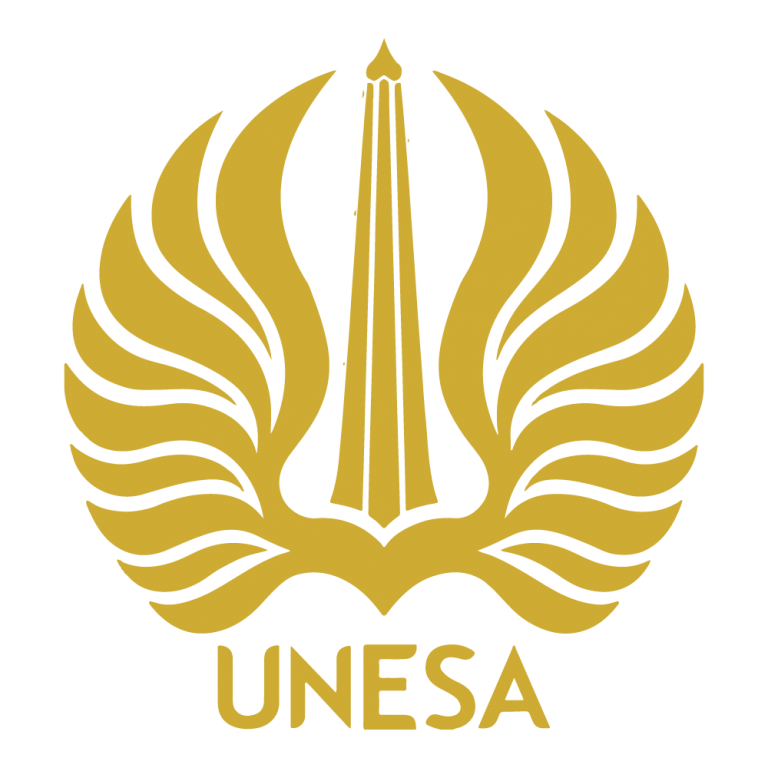STEAM-Based E-LKPD to Enhance Learning Independence on States of Matter Topic
DOI:
https://doi.org/10.26740/sjese.1.01.2025.5Keywords:
elementary school, steam approach, states of matter, learning independence, E-LKPDAbstract
This study aimed to develop an E-LKPD based on the STEAM approach on the topic of changes in the state of matter to improve the learning independence of fourth-grade elementary school students. The study employed the 4D development model (Define, Design, Develop, Disseminate). The subjects in this study were five fourth-grade students at SDN 1 Wonocoyo, Pogalan Sub-district, Trenggalek District. The instruments used included expert validation sheets, student response questionnaires, and learning independence questionnaires. The validation results showed that the E-LKPD was highly feasible for use, with an average validation score of 90%. Student responses to the E-LKPD indicated a high level of engagement and interest, reaching 92%. In addition, students’ learning independence scores increased significantly after using the E-LKPD, with a gain score of 0.47 (moderate category). Thus, the STEAM-based E-LKPD proved effective in enhancing the learning independence of fourth-grade students at SDN 1 Wonocoyo, Pogalan Sub-district, Trenggalek District.
References
Afrijal, A., Iswari, R. S., & Suryani, N. (2023). Validitas Lembar Kerja Peserta Didik Berbasis STEAM untuk Meningkatkan Literasi Sains Siswa Sekolah Dasar. Jurnal Inovasi Pendidikan IPA, 9(1), 55–65.
Angela, D., & Zulyusri. (2024). Meta-Analisis Pengaruh Pendekatan STEAM terhadap Hasil Belajar Siswa di Sekolah Dasar. Jurnal Inovasi Pendidikan Dasar, 8(1), 22–35.
Arkadiantika, I. et al. (2020). Pengembangan Media Pembelajaran Virtual Reality Pada Materi Pengenalan Termination Dan Splicing Fiber Optic. Jurnal Dimensi Pendidikan dan Pembelajaran, 8(1), p. 29. Available at: https://doi.org/10.24269/dpp.v0i0.2298.
Arsyad, A. (2015). Media Pembelajaran. Jakarta: Rajawali Pers.
Beers, S. Z. (2011). 21st Century Skills: Preparing Students for THEIR Future. Kappa Delta Pi Record, 47(1), 10–15.
Bybee, R. W. (2013). The Case for STEM Education: Challenges and Opportunities. NSTA Press.
Clark, R. C., & Lyons, C. (2011). Graphics for Learning: Proven Guidelines for Planning, Designing, and Evaluating Visuals in Training Materials. San Francisco, CA: Pfeiffer.
Dista, R., Prasetyo, D., & Wulandari, D. (2022). Pengaruh Pembelajaran STEAM Terhadap Kemandirian Belajar Siswa. Jurnal Pendidikan Sains, 10(1), 45-53.
Herlina, N., & Rachmadyanti, L. (2021). Media Interaktif Berbasis STEAM untuk Meningkatkan Hasil Belajar IPA. Jurnal Teknologi Pendidikan, 23(2), 120-130.
Hamidah, N., & Mastoah, S. (2025). Transformasi Digital dalam Pembelajaran Abad 21: Peluang dan Tantangan Penggunaan E-LKPD di Sekolah Dasar. Jurnal Teknologi Pendidikan, 13(2), 55–66.
Herlina, N., & Rachmadyanti, L. (2021). Media Interaktif Berbasis STEAM untuk Meningkatkan Hasil Belajar IPA. Jurnal Teknologi Pendidikan, 23(2), 120-130.
Hwang, G.-J., Chu, H.-C., & Yin, P.-Y. (2015). Development of a Context-Aware Ubiquitous Learning Environment Based on the Integration of STEM, Problem-Based Learning and Flipped Classroom. Educational Technology & Society, 18(4), 28–41.
Isnaningrum, I., & Marliani, N. (2025). Penggunaan Steam Untuk Pendidikan Anak Usia Dini. SAMBARA: Jurnal Pengabdian Kepada Masyarakat, 3(2), 456-464.
Jannah, Y. M., Yuniawatika, Y., & Mudiono, A. (2020). Pengembangan E-Modul Berbasis Game Based Learning Materi Pengukuran Dengan Penguatan Karakter Gemar Membaca dan Menghargai Prestasi. Jurnal Gantang, 5(2), 179-189.
Joyce, B., Weil, M., & Calhoun, E. (2015). Models of Teaching (9th ed.). Boston: Pearson.
Kemdikbud. (2022). Panduan Pembelajaran dan Asesmen: Sekolah Dasar. Jakarta: Kementerian Pendidikan, Kebudayaan, Riset, dan Teknologi.
Kuo, Y.-C., Walker, A. E., Belland, B. R., & Schroder, K. E. E. (2014). A Predictive Study of Student Satisfaction in Online Education Programs. The International Review of Research in Open and Distributed Learning, 15(1), 67–89.
Land, M. H. (2013). Full STEAM ahead: The Benefits of Integrating The Arts into STEM. Procedia Computer Science, 20, 547–552.
Maydiantoro, Albet (2021) Model-Model Penelitian Pengembangan (Research and Development). Lampung: FKIP Universitas Lampung.
Mayer, R. E. (2009). Multimedia Learning (2nd ed.). New York: Cambridge University Press.
Nilson, L. B., & Zimmerman, B. J. (2023). Creating self-regulated learners: Strategies to strengthen students’ self-awareness and learning skills. Routledge.
Nurjannah, P. K. (2024). Pengaruh Model Pembelajaran Inkuiri Terhadap Hasil Belajar Ipa Siswa Materi Perubahan Wujud Benda Di Kelas Iv Sd Quantum School Medan Tp 2023/2024 (Doctoral dissertation, UNIVERSITAS QUALITY).
OECD. (2018). The Future Of Education And Skills: Education 2030. OECD Publishing.
Piaget, J. (1972). Psychology and Epistemology: Towards a Theory of Knowledge. New York: Penguin.
Pintrich, P. R. (2004). A Conceptual Framework For Assessing Motivation and Self-Regulated Learning in College Students. Educational Psychology Review, 16, 385–407.
P21 Partnership for 21st Century Learning. (2019). Framework for 21st century learning. Retrieved from https://www.battelleforkids.org/networks/p21.
Sihotang, C., & Sibuea, A. M. (2015). Pengembangan Buku Ajar Berbasis Kontekstual Dengan Tema Sehat Itu Penting. Jurnal Teknologi Informasi & Komunikasi Dalam Pendidikan, 2(2), 169-179.
Smaldino, S. E., Lowther, D. L., & Russell, J. D. (2015). Instructional Technology and Media for Learning (10th ed.). Boston: Pearson.
Sugiyono. (2019). Metode Penelitian Kuantitatif, Kualitatif, dan R&D. Bandung: Alfabeta.
Quigley, C., Herro, D., & Jamil, F. M. (2017). Integrating Arts Education and STEM: An Exploratory Study of a STEM + Arts Program. Journal of STEM Education, 18(4), 29-35.
Trisnawaty, A., & Slameto. (2017). Pengaruh Metode Ceramah terhadap Hasil Belajar IPA Siswa Sekolah Dasar. Jurnal Ilmu Pendidikan, 19(1), 45–51.
Tristiana, R., & Rusnilawati, R. (2023). Efektivitas LKPD Berbasis STEAM dalam Meningkatkan Motivasi dan Hasil Belajar IPA. Jurnal Pendidikan Inovatif, 15(2), 78-87.
Widyastuti, L. (2022). Penerapan Pendekatan STEAM dalam Pembelajaran IPA untuk Meningkatkan Kemampuan Berpikir Kritis dan Kreatif Siswa. Jurnal Pendidikan dan Pembelajaran Sains, 7(2), 101–110.
Vygotsky, L. S. (1978). Mind in Society: The Development of Higher Psychological Processes. Cambridge, MA: Harvard University Press.
Waseso, H. P., Sekarinasih, A., & Prasetyo, S. (2024). Implementasi Pembelajaran Sains dalam Kurikulum Merdeka: Membangun Kemandirian Berpikir Siswa Sekolah Dasar. Nusantara: Jurnal Pendidikan Indonesia, 4(4), 1001-1016.
Wati, E., Harahap, R. D., & Safitri, I. (2022). Analisis Karakter Siswa pada Mata Pelajaran IPA di Sekolah Dasar. Jurnal Basicedu, 6(4), 5994-6004.
World Bank. (2023). Indonesia Education Statistics and Monitoring Report. https://www.worldbank.org/en/country/indonesia/publication/education.
Yakman, Georgette. (2012). Exploring the Exemplary STEAM Education in the U.S. as a Practical Educational Framework for Korea. Korean Association for Science Education, 32: 1072–86.
Zimmerman, B. J. (2002). Becoming a self-regulated learner: An overview. Theory into Practice, 41(2), 64–70. https://doi.org/10.1207/s15430421tip4102_2.
Downloads
Published
Issue
Section
 Abstract views: 146
,
Abstract views: 146
, PDF Downloads: 176
PDF Downloads: 176









